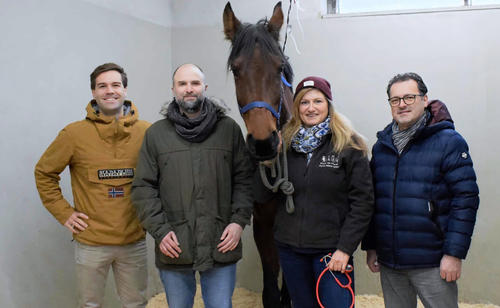Horse owners can breathe a sigh of relief
Research for the horse (from left to right): Florian Bartenschlager, Lars Mundhenk, Heidrun Gehlen, Zoltán Konthur
Image Credit: Katharina Landmann
News from Feb 19, 2024
From the Tagesspiegel insert from February 18, 2024. By Catarina Pietschmann.
When a horse's lungs inflate during breathing, 40 to 55 liters of air flow in and out again. Eight to 16 times per minute - at rest. In a racehorse under maximum stress, it is up to 150 times per minute. This happens exclusively through the nostrils, as horses cannot breathe through their mouths. No wonder that respiratory diseases have a massive impact on the performance of the animals. Typical signs of asthma are coughing, nasal discharge and, in severe cases, weight loss.
Civilization disease in horses
According to a survey of German equine clinics conducted by the School of Veterinary Medicine at Freie Universität Berlin, up to 90 percent of patients there with respiratory diseases suffer from equine asthma. According to studies, almost 80 percent of all horses in the northern hemisphere are affected by mild to moderate asthma, which is why experts are already calling it a civilization disease.
Exactly how the disease develops is unclear. “But dust exposure and housing conditions certainly play a role. Possibly also mold spores,” says Lars Mundhenk, private lecturer at the Institute of Animal Pathology at Freie Universität. The best intervention – in addition to drug therapy – is to bring the horses out into the fresh air and ensure good quality hay in order to reduce dust exposure. Being able to distinguish asthma from a lung infection is important for therapy. This is because cortisone is the drug of choice for asthma - antibiotics are usually used for a bacterial infection.
A quick test to detect asthma
The earlier asthma is detected, the better it is for the further course of the disease. Although asthma cannot be cured, early action can prevent irreversible changes: The more advanced the disease, the more the lung tissue is altered by remodeling processes and the breathing volume continues to shrink. “However, detecting the mild stages in particular is a diagnostic challenge because the animal hardly shows any symptoms at this stage,” explains the veterinarian. This could soon change, as the team led by Professor Heidrun Gehlen from the Equine Clinic at Freie Universität, Florian Bartenschlager and Lars Mundhenk, together with Fiona Dumke, Benno Kuropka, Chris Weise and Professor Achim Gruber, have found markers in the lung fluid of four-legged patients that could enable a rapid test similar to the corona test. If asthma is suspected, a so-called broncho-alveolar lavage (BAL) is usually carried out. To do this, half a liter of fluid is inserted into the lungs through a tube, sucked out again and examined under a microscope. If there is no clinic nearby, vets send the sample in, which can delay the results by days. On closer analysis of this lung lavage fluid, the researchers discovered that the amount of certain proteins was elevated in all asthmatic horses.
Currently, the researchers are still dependent on the lavage fluid for suitable sample material. After all, the disease takes place in the deep airways. “We now want to see whether we can also find markers in the upper airways - i.e. nostrils and throat - or even in the blood that are helpful for an accurate diagnosis,” says Lars Mundhenk. The aim is also to investigate whether other parameters can be used to determine the severity of the disease.
The project started in 2020 with start-up funding from the university and department and has been funded by the Deutsche Forschungsgemeinschaft (German Research Foundation) since 2023. Investitionsbank Berlin has also joined the funding with its ProValid funding program.
The team is currently working with molecular biologist Zoltán Konthur from the Bundesanstalt für Materialforschung und -prüfung (Federal Institute for Materials Research and Testing) to test the technical feasibility of the rapid test. A patent application has already been filed for the most promising marker candidate to date.
“Developing a product is an unusual and exciting field for us,” emphasizes Mundhenk. The researchers won second place in the Berlin universities' “Research to Market Challenge” in the Lifescience & Health category with the 2022 project. The question will soon be asked: Do we set up a company ourselves? Or do we sell licenses? Until then, research is to be extended to cats - also with a view to the market - as they also frequently suffer from asthma. Such a rapid test would also be helpful for the human species, which also needs to be investigated.
By Catarina Pietschmann
